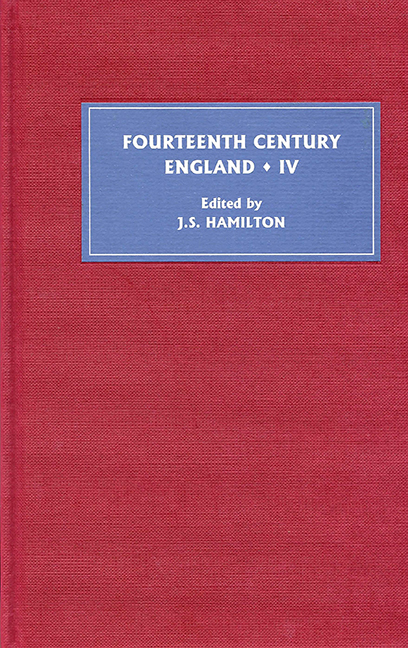Book contents
- Frontmatter
- Contents
- List of Illustrations
- Contributors
- Preface
- Abbreviations
- Who was St Thomas of Lancaster? New Manuscript Evidence
- ‘Hedging, Ditching and Other Improper Occupations’: Royal Landscapes and their Meaning under Edward II and Edward III
- Paying for the Wedding: Edward III as Fundraiser, 1332–3
- The Politics of Privilege: Thomas Hatfield and the Palatinate of Durham, 1345–81
- Agnes Maltravers (d. 1375) and her Husband John (d. 1364): Rebel Wives, Separate Lives, and Conjugal Visits in Later Medieval England
- Gendering Pastoral Care: John Mirk and his Instructions for Parish Priests
- Prosecution of the Statutes of Provisors and Premunire in the King's Bench, 1377–1394
- ‘Mercy and Truth Preserve the King’: Richard II's Use of the Royal Pardon in 1397 and 1398
- Aliens in the Pardons of Richard II
- ‘Too Flattering Sweet to be Substantial’? The Last Months of Thomas, Lord Despenser
- ‘O Prince, Desyre to be Honourable’: The Deposition of Richard II and Mirrors for Princes
- Regional Politics, Landed Society and the Coal Industry in North-East England, 1350–1430
Agnes Maltravers (d. 1375) and her Husband John (d. 1364): Rebel Wives, Separate Lives, and Conjugal Visits in Later Medieval England
Published online by Cambridge University Press: 12 September 2017
- Frontmatter
- Contents
- List of Illustrations
- Contributors
- Preface
- Abbreviations
- Who was St Thomas of Lancaster? New Manuscript Evidence
- ‘Hedging, Ditching and Other Improper Occupations’: Royal Landscapes and their Meaning under Edward II and Edward III
- Paying for the Wedding: Edward III as Fundraiser, 1332–3
- The Politics of Privilege: Thomas Hatfield and the Palatinate of Durham, 1345–81
- Agnes Maltravers (d. 1375) and her Husband John (d. 1364): Rebel Wives, Separate Lives, and Conjugal Visits in Later Medieval England
- Gendering Pastoral Care: John Mirk and his Instructions for Parish Priests
- Prosecution of the Statutes of Provisors and Premunire in the King's Bench, 1377–1394
- ‘Mercy and Truth Preserve the King’: Richard II's Use of the Royal Pardon in 1397 and 1398
- Aliens in the Pardons of Richard II
- ‘Too Flattering Sweet to be Substantial’? The Last Months of Thomas, Lord Despenser
- ‘O Prince, Desyre to be Honourable’: The Deposition of Richard II and Mirrors for Princes
- Regional Politics, Landed Society and the Coal Industry in North-East England, 1350–1430
Summary
When Agnes Maltravers died in the summer of 1375, she was one of wealthiest women of the lesser peerage. Holder of dower and jointure lands from three husbands, and an heiress in her own right, upon her death Agnes controlled at least twenty-eight manors spread throughout East Anglia, the Welsh Marches and the south-west. Her personal possessions at the time of the writing of her will were equally impressive: among other bequests, she was able to distribute valuable forget-me-nots to relatives and friends, including her ‘great cup’, one dragenall, six plates, six pottengers, six saucers, and two pitchers, all made of silver. As well as these and other valuable chattels given out to relatives and friends, at death, she also believed that she would have enough accessible cash to promise at least seventy pounds in monetary gifts to various churches, priories, hospitals, local houses of all four mendicant orders, as well as to servants and executors. Nonetheless, though she had luxurious tastes, as well as personal generosity, it is not as simple to say that Agnes was a spendthrift: for herself, she ordered ‘that no manner of finery of gold cloth should be put on my body except five candles, each candle of five pounds of wax’. Indeed, the affluence present at the end of her life masked a long period of genteel insecurity earlier on, when she had to fight both to regain and retain what was hers by right and also to look after the interests of her last, and most controversial, husband – John Maltravers.
Agnes was the daughter of William de Bereford, Chief Justice of the Common Pleas – a charismatic individual who had been on the commission to hear complaints against Edward I's treasurer, an executor to the will of Piers de Gaveston and later a Lancastrian retainer – and Margaret, daughter of Hugh, Lord de Plescy, the first peer of the family, but of a long line of Scottish, Welsh and French campaigners.
- Type
- Chapter
- Information
- Fourteenth Century England IV , pp. 80 - 92Publisher: Boydell & BrewerPrint publication year: 2006



